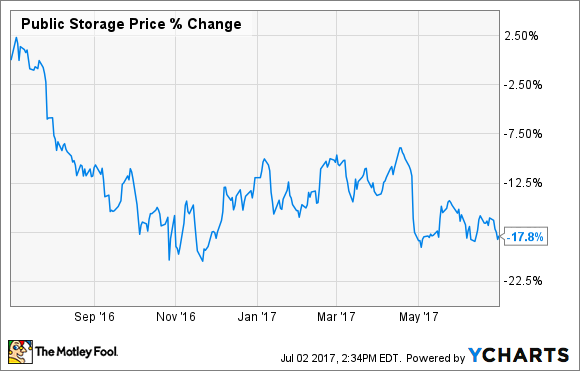Self-storage real estate investment trust Public Storage (PSA -0.58%) has generated fantastic returns for its long-term investors. In fact, over the past 30 years, the stock has produced an average total return of 15.2%, a remarkable level of performance to sustain over three decades. However, the past year hasn't been great for Public Storage and its shareholders, with the stock down nearly 18%. Rising interest rates have put pressure on REITs in general, and self-storage investors are worried about oversupply issues.
Despite the headwinds, now could be an excellent time to buy the clear leader in the self-storage industry at a discount. Here's why Public Storage could continue its history of market-beating performance for the next 30 years.

Image source: Getty Images. (Note: This image doesn't necessarily depict a Public Storage facility.)
Why has Public Storage fallen by 18%?
Public Storage is the clear leader in the self-storage industry, with about 2,600 facilities in the U.S. and Europe. No other company comes close to Public Storage in terms of size, or brand recognition. Over the long run, Public Storage's stock has a clear upward trajectory, but the past year has been a disappointment for investors.
There are a few reasons for the dismal performance, and a couple in particular that are likely to be the main drags. Interest-rate increases are the first, as the entire REIT sector started to underperform once it became apparent that the Federal Reserve planned to start raising interest rates.
Second is oversupply worries. In some of Public Storage's key markets, more new supply of self-storage facilities is coming online than the market can absorb. As Chairman and CEO Ronald Havner said in Public Storage's 2016 annual report, "Going into 2017, we face the most new supply in over a decade."
This is perfectly natural after years of growth. After all, Public Storage's revenue has grown by 40% since 2012, so it's only natural that self-storage companies want a piece of the action during good times. However, it can create a short-term drag on Public Storage's earnings, as oversupply creates more competition.
Reasons to love Public Storage over the long run
There are several long-term catalysts that should allow Public Storage to continue to produce strong long-term performance. Just to name a few:
- Brand strength and size. There is no self-storage brand as recognizable as Public Storage. Brand reputation can increase a company's pricing power, and Public Storage's size gives it the ability to run more efficiently and temporarily undercut the competition while staying profitable if it needs to.
- Financial flexibility. Public Storage has a rock-solid balance sheet and has historically avoided using debt to finance its properties. In fact, the company had absolutely no debt until very recently, when it chose to take advantage of the persistent low-interest environment.
- Low breakeven point. Public Storage said in a recent annual report that it can break even with just 30% occupancy, and the company's properties are currently over 90% full. So, while self-storage facilities are on short-term leases and can see earnings drop during recessions, Public Storage certainly has plenty of cushion before it would start losing money.
- Growth through development. Public Storage mainly grows through acquisitions, but has started to develop properties from the ground-up in recent years, which can be a highly effective way of creating value. As a simplified example, let's say it would cost Public Storage $10 million to buy a certain property that would generate a 6% cash-on-cash yield, or $600,000 in annual income. If it can build the same property for just $7.5 million, not only does it create $2.5 million in value for shareholders, but now the property's $600,000 in income translates to an 8% yield. This is a simplified example, but Public Storage estimates that developments produce returns on invested capital that are 2%-3% higher than acquired properties.
This is a long-term investment
To be perfectly clear, I'm not suggesting that Public Storage stock is going to perform well over the next week, month, or year. In fact, there are some scenarios, such as rapidly rising interest rates to name just one, that could cause the stock to fall. In addition, Public Storage isn't exactly a defensive REIT. It's month-to-month lease structure makes it somewhat vulnerable to recessions, since it's easy for tenants to leave.
It's important to approach a stock like Public Storage from a long-term perspective, and be willing to ride out the ups and downs along the way. Over long periods of time, there is no reason to believe that Public Storage won't continue its track record of strong performance.






